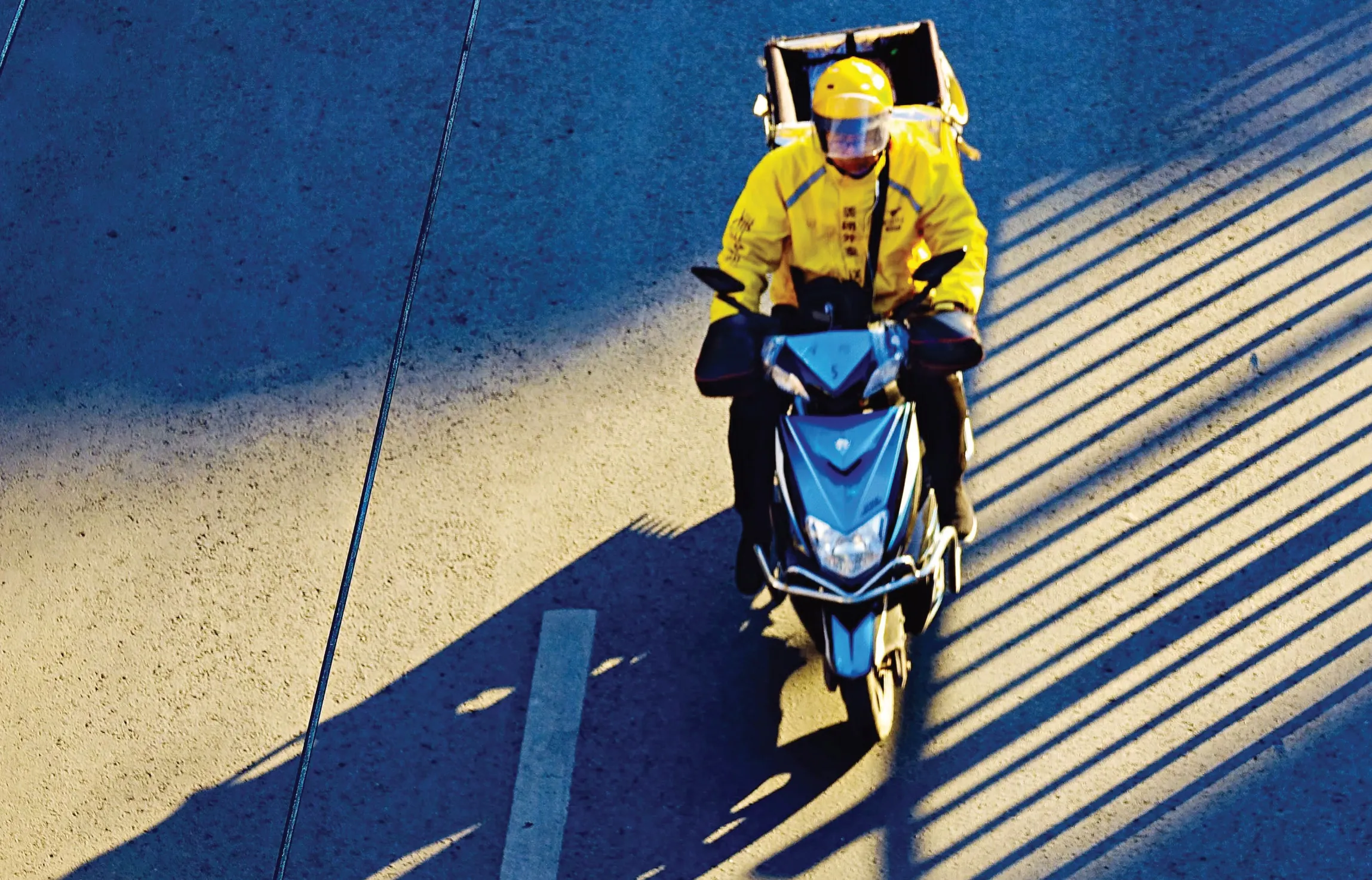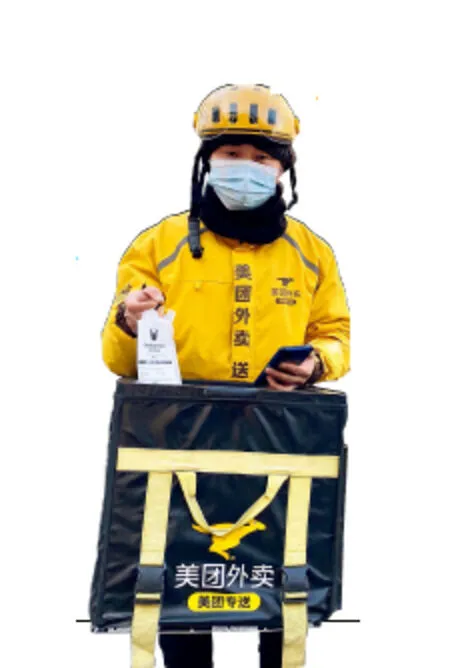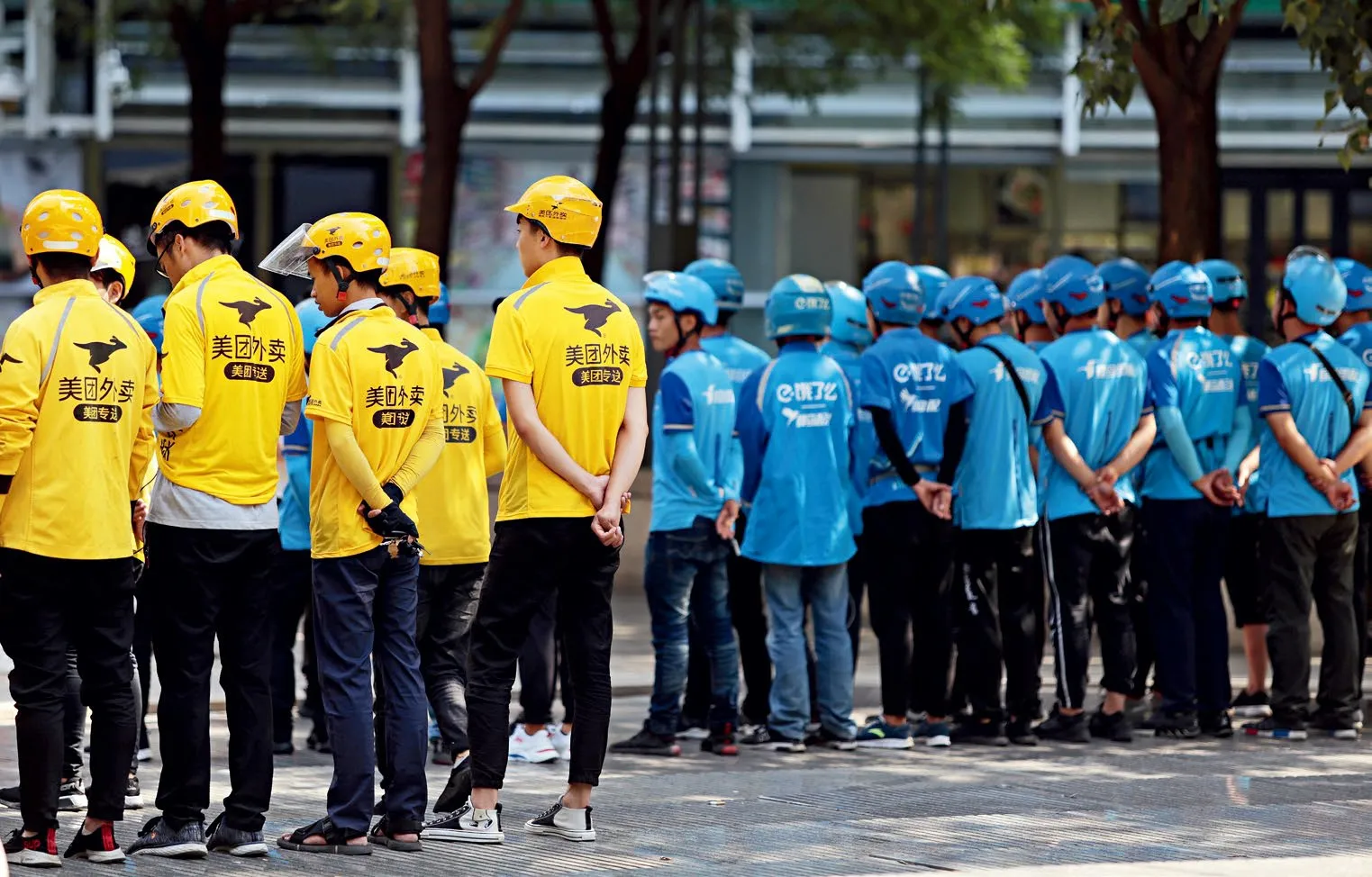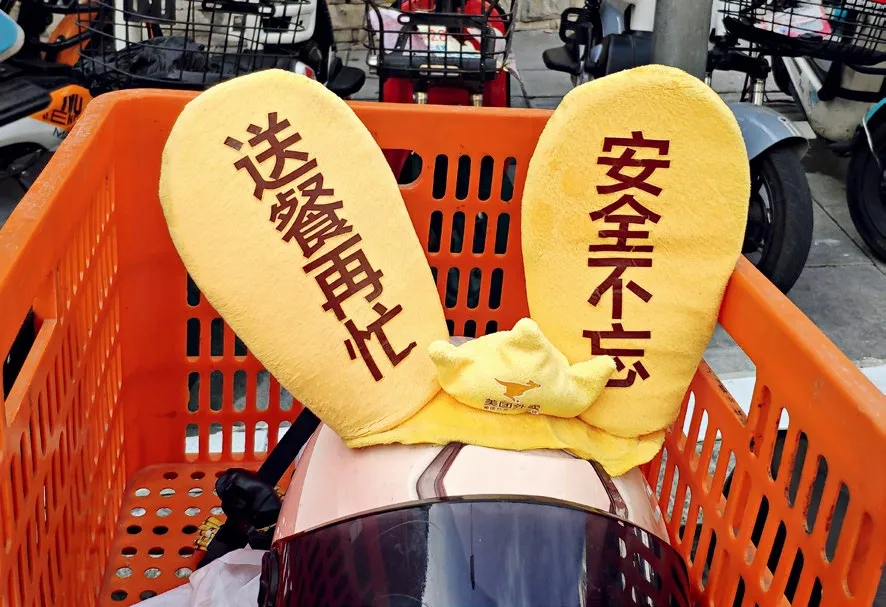A Day in the Life of Food Delivery
2022-06-23ByZhangLijuan
By Zhang Lijuan

A food delivery rider for Meituan delivers takeout in Qingdao, Shandong Province, on March 23, 2019. (VCG)
Just before 10 a.m. on January 17, Gao Feng, a food courier for Meituan, one of China’s biggest food delivery service providers, arrived at the Dawanglu Station of Beijing Subway to participate in a morning meeting. Dawanglu Station is located in the eastern district of the International Trade Center, one of Beijing’s busiest commercial districts. During the morning meeting, his manager outlined potential problems and reminded Gao and his colleagues of certain things before they started work.
A One-track Mind
After the morning meeting, Gao came to the Gemdale Plaza (Beijing Jindi center) at 10:10 a.m. “Generally, the first order comes after 10:20 a.m.,” he explained. “After the morning meeting, we wait at the shopping mall for the first order.”
“You have an order from Meituan,” announced a text message, informing Gao of his first order at 10:20 a.m. He was instructed to deliver takeout from a restaurant in the Gemdale Plaza to the tenth floor of the No.11 building of Wanda Plaza.
Rather than rush to the pickup, experienced Gao continued taking his time. “The restaurant just opened,” he explained. “It will take some time for them to cook it.” Six minutes later, Gao left for the restaurant. As soon as he scanned his health QR code upon arriving at the restaurant, the packaged meal appeared on the counter.

Gao’s enthusiasm and efforts make him an excellent food delivery driver.
“I have been a food deliveryman for years, and I pay attention to details,” Gao said of his fortuitous timing.
After graduating from a secondary vocational school at age 18, Gao joined the army and worked in artillery. An instructor described Gao as one with a “one-track mind” who is stubborn and assiduous. Gao would practice tidying up and train for an extra hour every night. He finally set a record by finishing a 5-kilometer run in only 18 minutes.
Gao started working for Meituan in April 2018. He concentrated on all the details of working food delivery and gained a lot of experience. Now, he hardly needs to look at a map to find any address in the area.
Responsible for Each Order
“My delivery area is the central business district (CBD) with a lot of office buildings,” he said. “Orders come in quickly during lunch hours from 11:00 a.m. to 1:00 p.m.” Gao reported receiving an average of 35 orders a day, 25 during lunch rush.
His phone incessantly chiming with new orders, Gao’s lunch hour was frenzied. Noon’s arrival brings the absolute peak, during which time the app assigned him two or three orders to be delivered together. Delivering three orders at once requires deft precision. Two addresses were in the same building, one on the eighth floor and the other on the fifth floor.
Despite the many flights to be scaled, Gao headed to the staircase instead of the elevator. “You cannot rely on elevators during the peak hours, because they are crowded and you have to wait while they stop at every floor,” he explained. “The stairs are always faster.”
He handed one bag of food to a customer on the fifth floor and another on the eighth. Despite breaking a sweat, he bolted back down the stairs to deliver the next order. “I have to take the stairs during peak hours or everything will be late,” he said.
By now, Gao knows his delivery area like the back of his hand. He pays close attention to all the information on each order and knows which businesses are closest to elevators and which are closer to staircases. He knows every entrance to a community and the best route to get to each building. Gao is also careful with the food. He pays particular attention to the temperature of the milk tea he delivers. If the beverage is iced and it is summer, he places them in insulated cases.
But even in peak hours, Gao does not ride very fast. “I had two accidents,” he reported. “I got hit and the driver took full responsibility. Even though it was not my fault, I still learned from the accidents. I do not run red lights or go the wrong way down one-way streets. I don’t speed even if I lose money because of it.”
“The floor at this address is too high, so we have to wait for the elevator,” he sighed. “We’re going to be four minutes late.” Despite his best efforts to rush, he still called the customer to apologize for being late while waiting for the elevator. When he handed over the food, he apologized again.
Gao’s enthusiasm and efforts make him an excellent food delivery driver. Records of about 800 deliveries in a month show his punctuality rate at 99.8 percent and customer satisfaction at 100 percent. “I was devoted to military service as a soldier, and now I serve the people through delivery,” he said. “I take full responsibility for each order.”

Gao Feng delivering takeout.

Food delivery drivers from Meituan and Ele.me, China’s two largest catering and food delivery platforms, participate in a regular daily meeting on August 1, 2019. (VCG)
Rapid development of the platform economy has caused a significant increase in new employment forms of workers. As the economic scale of the takeout delivery market grew to hundreds of billions of yuan, about 7.7 million people became involved in food delivery, including Gao. They are like the pulse of the cities, and their contributions are indispensable. Even during the 2020 Spring Festival holiday amid COVID-19 pandemic, nearly 20,000 food delivery workers shuttled across Beijing delivering orders that numbered 400,000 each day on average.
Veteran Rider

Rabbit-ear decorations with the slogans “meals delivered” and “safety in mind” are found on the helmets of Meituan food delivery drivers. (VCG)
“Now that 25 orders have been delivered, over half of the day’s work is done,” Gao grinned. “It’s time to have lunch.” At 1:10 p.m., Gao signed off his order-receiving system. Between 1:30 p.m. and 5:00 p.m. are the off-peak hours during which time he only receives about four or five orders.
But he still stays careful. Gao has gone to the wrong address before. Once, an order was scheduled for delayed delivery, so Gao didn’t pay much attention to it as he was chatting with a friend on his phone. Because of all the chatting, he mistakenly went to the wrong building. “You are a veteran rider and shouldn’t make such silly mistakes,” chided the customer, an admonition Gao still remembers clearly.
Gao is always ready to help others. He donates money for people in need, turns on his headlights to illuminate the roads for people walking at night, and even takes customers’ trash out for them. His kindness has been rewarded with favorable comments not only from customers but restaurateurs alike.
The evening peak hours arrive at 5:00 p.m. Gao got busy again. He was notified to deliver takeout from the CBD Wanda Plaza in Chaoyang District to No. 10 Langjiayuan Road. Gao took an overpass far from the route he took hours before.
Evening rush hour traffic was to blame. Traffic jams tend to delay his evening travels on the streets. “In the CBD, the traffic begins as early as 5:00 p.m. You have to use the overpass, or you will be late every time.”
He received a total of six orders during the dinner hours. “Because of the traffic, the number of orders in business areas during this time period is not very high actually,” he said. “But I still usually work till 8:00 p.m.”
Gao logged out of the app again at eight sharp. “Now I am going to pick up my wife from work,” he said. He finished 35 orders that day. “That’s about average for me. I’m not exhausted by 35, and that’s a decent workload for me.”
Extraordinary people can excel even at the most ordinary work. “The job in food delivery brought great changes to me and my family,” Gao said. “I earn a guaranteed salary of about 10,000 yuan a month, and my family life is improving.” Gao hopes to continue studying and earn a bachelor’s degree to make good on his plans for the future.
